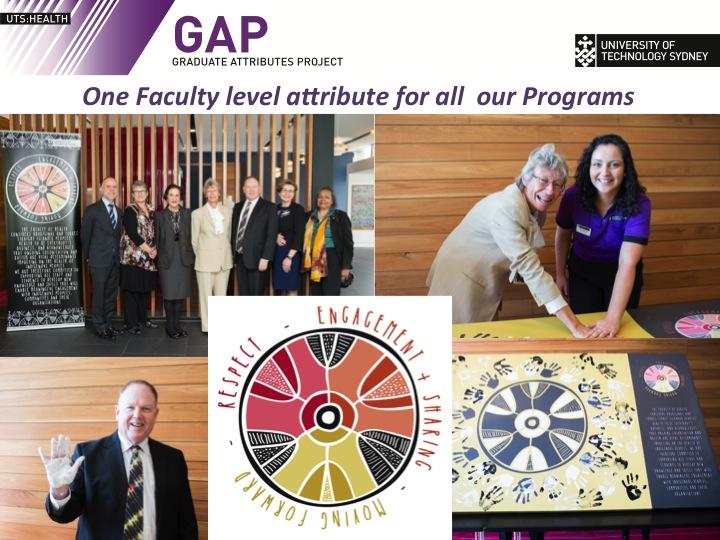Faculty of Arts and Social Sciences
The Faculty of Arts and Social Sciences (FASS) has six Graduate Attributes (GA) that apply to all courses across the Faculty. These are:
- professional readiness
- critical and creative inquiry
- international and intercultural engagement
- Indigenous competencies
- active citizenship
- effective communication
The FASS graduate attributes and Course Intended Learning Outcomes reflect and contextualise UTS Graduate Attributes in ways applicable to the disciplines in FASS.
Course Intended Learning Outcomes for externally accredited courses, such as initial teacher education, are aligned with the relevant professional accreditation standards.
Graduate-level capability in all CILOs is assured through advanced subjects, including capstone projects and work-integrated learning experiences.
UTS Business School
All UTS Business School courses have a set of Graduate Attributes (GAs) and program learning objectives (equivalent to course intended learning outcomes). The GAs are:
- intellectual rigour and innovative problem solving
- communication and collaboration
- social responsibility, economic justice and equality
- professional and technological expertise
- work for and with Indigenous Australians
To complement these attributes, the UTS Business School has established processes for assurance of learning and achievement of GAs that are aligned to the requirements for accreditation by the Association for Advancement of Colleges and Schools of Business (AACSB).
Faculty of Design, Architecture and Building
The Faculty of Design, Architecture and Building has developed a common set of five graduate attribute categories that have been accepted across all three Schools. The acronym CAPRI is being used to encourage staff and students to remember and apply these five categories of GA development:
- C = Communication and Group work
- A = Attitudes and Values
- P = Practical and Professional
- R = Research and Critique
- I = Innovation and Creativity
These attribute categories were developed through a series of staff meetings together with student consultations through focus groups and questionnaires. Through student collaboration, the Faculty has developed a web-based animation to communicate to students the importance of GA development, which is available on YouTube.
Faculty of Engineering and Information Technology
In the Faculty of Engineering and IT graduate attributes connect discipline specific knowledge and self understanding with capabilities needed in the world. They articulate the dispositions which prepare our graduates as socially responsible professionals and technical experts who can contribute to a sustainable future world.
Engineering and IT graduate attributes are:
- Indigenous Professional Capability
- Socially responsible
- Design oriented
- Technically proficient
- Collaborative and communicative
- Reflective
Faculty of Health
In the Faculty of Health, program teams have taken a strong commitment to ‘whole of program’ approaches to curriculum development as well as learning and teaching practices. Program-specific GAs and CILOs have been developed for Midwifery, Sport and Exercise Science, Nursing, Postgraduate programs (Health) and then some specific Postgraduate programs including Health Services Management and Child and Family Health Nursing. This has been achieved alongside extensive whole of course and subject reviews. An example of a program-specific (Midwifery) set of GAs are:
- woman centred care
- professional competence
- collaboration
- resilience
- diversity
- professional engagement
- Indigenous Cultural Respect
The Faculty has made strong use of consultations with industry and key stakeholders, and aims to continue these connections with an aim to increase student participation and feedback over coming months. In addition to program working teams, the Faculty has established 3 working parties on Indigenous cultural competency, English language and e-Portfolios. A significant outcome has been the development of a Faculty level graduate attribute for Indigenous cultural competency i.e. graduates have professional cultural competency which contributes to the health and wellbeing of Indigenous Australians, inclusive of physical, social, emotional and spiritual wellness.
The Faculty of Health has developed a set of web-based animations (available on YouTube) to communicate to students the importance of GA development in their chosen course for example:

Faculty of Law
In the Faculty of Law, new GAs for undergraduate and postgraduate courses have been developed to reflect AQF standards and ALTC (2010) threshold learning outcomes and are now in place. All courses have CILOs and all subjects have Subject Learning Objectives (SLOs). The Undergraduate attributes are:
- Legal knowledge
- Ethics and professional responsibility
- Critical analysis and evaluation
- Research skills
- Communication
- Collaboration
- Indigenous professional capability
- Self-management
Working parties have defined introductory, intermediate and advanced levels of achievement for each Undergraduate GA and developed SLOs for each of these. The aim is to provide Law students with authentic learning environments informed by professional practice. These processes also serve to engage academics with the process of embedding GAs.
Faculty of Science
The Faculty of Science has taken a broad, faculty-wide approach, with each school supported to develop a discipline-specific set of learning outcomes for their courses and majors. GAs have been refined, clarified and benchmarked against the ALTC (2010) science threshold learning outcomes. An active ‘First Year in Science’ community of practice has been established, to foster improvement in first-year transition. The GAs are:
- Disciplinary Knowledge
- Research, inquiry and critical thinking
- Professional, ethical and social responsibility
- Reflection, Innovation, Creativity
- Communication
- UTS graduates will have knowledge of Indigenous Australian contexts to inform their capability to work effectively for and with Indigenous Australians across their professional discipline

